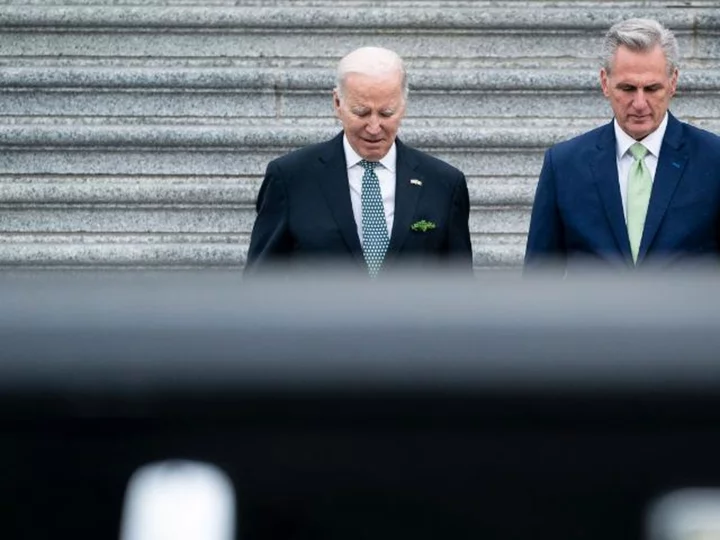President Joe Biden is set to meet with congressional leadership on Tuesday amid a stalemate in Washington to raise the debt ceiling and avoid a default that would have catastrophic economic consequences.
A path forward to raising the debt ceiling remains unclear. House Republicans want to attach spending reductions to a debt ceiling increase and have passed a debt limit plan that does just that. But Biden and congressional Democrats are insisting on passing a clean increase on the debt limit before addressing a framework for spending.
During Tuesday's meeting in the Oval Office at 4 p.m. ET -- the first in-person, top-level discussions to take place at the White House in months -- the president will be joined by House Speaker Kevin McCarthy, House Minority Leader Hakeem Jeffries, Senate Majority Leader Chuck Schumer and Senate Minority Leader Mitch McConnell.
Biden has not formally held a meeting with McCarthy since February, when the two last discussed the debt ceiling at the White House.
It remains to be seen whether the parties involved will agree to establishing a process for earnest negotiations.
McConnell -- known as a Senate deal maker with stronger ties to Biden than McCarthy -- has signaled that he won't come to rescue Democrats in negotiations, telling the president privately that it was up to him and McCarthy to come to an agreement, according to Bloomberg. McConnell told the news outlet on Monday, "The White House and the speaker's teams need to sit down now and settle it."
In the Senate, all but six Senate Republicans have vowed to oppose raising the debt ceiling "without substantive spending and budget reforms," backing McCarthy's position.
Meanwhile, the White House continues to maintain that Biden will not change course in his belief that Congress must do its job by raising the debt limit without conditions to avoid a catastrophic default and is determined to hold the line on demanding a clean debt ceiling increase, White House officials say.
Biden's goal, officials say, is to move spending negotiations onto a separate track, removing the threat of default while giving Republicans assurances he will engage in good-faith negotiations about federal spending. He also plans to ramp up public pressure on Republicans, traveling to New York on Wednesday to take aim at one of the 18 House Republicans hailing from districts Biden won in 2020.
"It's Congress' constitutional duty to act to prevent default. That's what the president's going to be very clear about," White House press secretary Karine Jean-Pierre told reporters during Monday's press briefing.
Jean-Pierre repeatedly refrained from setting certain expectations for Tuesday's meeting, at one point telling a reporter on Monday, "I wouldn't call it debt ceiling negotiations. I would call it a conversation between the four leaders and the president."
Office of Management and Budget Director Shalanda Young reiterated to reporters last week that the administration's position remains that "It is Congress' duty to ensure we don't default."
"Congress can put a bill on the floor tomorrow, avoid default," Young said during a White House briefing Thursday. "The DC drama, the political brinksmanship. That's what that is. Nothing is preventing Congress from moving to avoid default. And they need to do that, whether it's tomorrow or next week."
The US hit the debt ceiling set by Congress in January. That forced the Treasury Department to begin taking extraordinary measures to keep the government paying its bills. And Treasury Secretary Janet Yellen recently warned that the US could default on its obligations as soon as June 1 if Congress doesn't address the debt limit.
A breach of the US debt ceiling risks sparking a 2008-style economic catastrophe that wipes out millions of jobs and sets America back for generations, Moody's Analytics has warned. The impact could include delayed Social Security payments, late paychecks for federal employees and veterans and a direct hit to Americans' investments.









